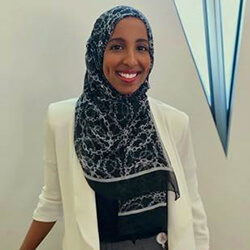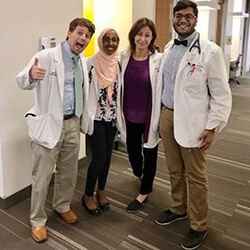Match Day Student Profile: Fawsia Osman
For four years, students at the University of Arizona College of Medicine – Phoenix have worked toward Match Day — the day they learn where they will spend the next several years as resident-physicians and a major step toward building their career in medicine. Match results are released nationally at ceremonies coordinated to occur at the exact same time across the country. Members of the Class of 2020 will receive letters that reveal where they will go for their residency training at precisely 9:00 a.m. Friday, March 20. The UA College of Medicine – Phoenix is profiling several students in advance of Match Day 2020.
Meet Fawsia Osman

Osman speaks fluent Swahili, which she said came in handy during her ICU rotation. She helped organize a family meeting for her patient when the health care team was unable to get in touch with the patient’s family.
Path toward Medicine
Osman said she knew from an early age she wanted to pursue medicine.
“Medicine allows me to help others while being constantly engaged and intellectually challenged,” she said. “I look forward to learning something new every day, whether from my patients’ personal stories or the diseases that ail them.
“It’s a privilege to take care of patients from all walks of life — sometimes during the most vulnerable and difficult times of their lives. It’s truly a special bond built on trust that provides a glimpse into a patient’s life beyond their illness. These personal relationships make it all worth it, and I can't imagine myself doing anything else.”
Choosing a Specialty
Osman said she changed her mind “more times than I can count.”
It wasn’t until her last rotation of third-year, while on an internal medicine clerkship, she found her fit.
“It’s a field that requires a wide breadth of knowledge and emphasizes an understanding of the rationale behind each diagnosis, treatment and management plan,” Osman said. “It also provides the opportunity to form long-term relationships with patients and be able to provide continuity of care.”
Extracurricular Activities
Osman is enrolled in the dual degree MD/MPH program and is looking forward to incorporating public health in her career and specialty. She co-chaired the Health Fairs Community Health Initiative – Phoenix (CHIP) Program, where she worked with local community programs to recruit medical students and physicians in providing care to uninsured and underserved communities in Phoenix.
She also enjoyed working as a gross anatomy tutor during her second year.
Why the College of Medicine – Phoenix
Osman said the culture at the University of Arizona College of Medicine – Phoenix is like no other. “We work hard, while fostering a collaborative and supportive environment that allows students to thrive. We are surrounded by faculty and staff who genuinely want the best for us and will go the extra mile to help us. The curriculum and clinical training are excellent with endless opportunities that train us to become well-rounded clinicians.”
Favorite Medical School Memory
“Those that stand out are my surgery and family medicine rural rotations at Tséhootsooí Medical Center on the Navajo reservation, and my time with the Hepato-Pancreato-Biliary (HPB) surgical team at Banner – University, where I was part of the organ procurement team,” she said.
Advice to Current or Future Medical Students

“You’ve worked hard to get to where you are and while you still have a long way to go, appreciate how far you’ve come. Enjoy the process, celebrate the small victories and when faced with challenges along the way, reach out to your support system to help you get through it.”
About the College
Founded in 2007, the University of Arizona College of Medicine – Phoenix inspires and trains exemplary physicians, scientists and leaders to advance its core missions in education, research, clinical care and service to communities across Arizona. The college’s strength lies in our collaborations and partnerships with clinical affiliates, community organizations and industry sponsors. With our primary affiliate, Banner Health, we are recognized as the premier academic medical center in Phoenix. As an anchor institution of the Phoenix Bioscience Core, the college is home to signature research programs in neurosciences, cardiopulmonary diseases, immunology, informatics and metabolism. These focus areas uniquely position us to drive biomedical research and bolster economic development in the region.
As an urban institution with strong roots in rural and tribal health, the college has graduated more than 1,000 physicians and matriculates 130 students each year. Greater than 60% of matriculating students are from Arizona and many continue training at our GME sponsored residency programs, ultimately pursuing local academic and community-based opportunities. While our traditional four-year program continues to thrive, we will launch our recently approved accelerated three-year medical student curriculum with exclusive focus on primary care. This program is designed to further enhance workforce retention needs across Arizona.
The college has embarked on our strategic plan for 2025 to 2030. Learn more.